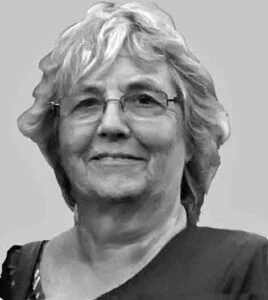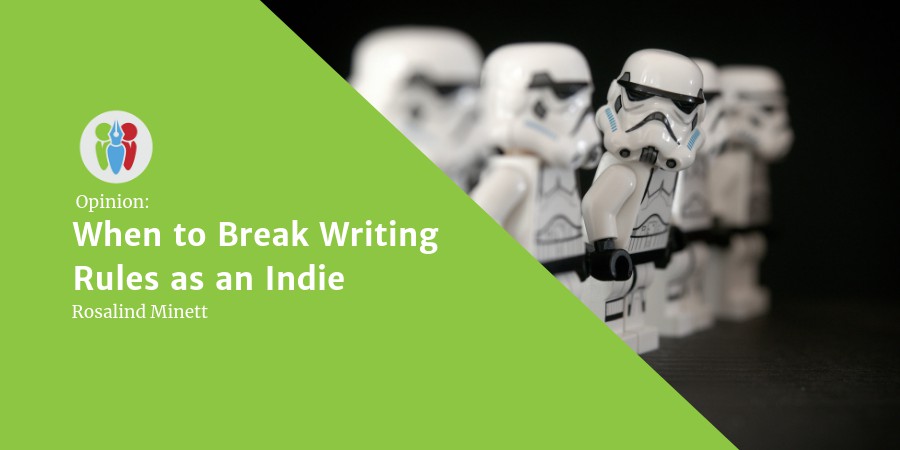I'm sure if we all looked hard enough, we'd be able to find a bit of rebel inside us. But there's a time for rebellion and a time for sticking with writing rules. After all, some of them stop sentence errors and awkward reader emails. But one of the many luxuries of being an indie author is being able to selectively break the rules. Rosalind Minett, author member, is pulling out her inner rebel to talk about when it's okay to break writing rules as an indie.
Expulsion

British indie author Rosalind Minett
I was once expelled from school aged eight. We were lined up in the playground and each child was individually asked if s/he had booed an unpopular teacher at Prizegiving.
“No Miss P.”
“No Miss P.”
“No Miss P.”
Sick of this, when it came to me, I said, “Yes,” and even worse, without the “Miss P.”
This did have the effect of bringing the futile and painful exercise to an end. Although it was later established that I hadn’t even been present at prize-giving. And so, my teachers naturally regarded me with suspicion for the rest of my time at the school.
The Educated Cliché
English included intensive cliché learning. It was thought academically brilliant to be able to respond rapidly to: “As bright as a …” “As fat as …” “As black as a …”
The ONLY acceptable answers to which were button, butter, and a sweep respectively. Having faithfully learned dozens of these clichés, I noticed that not all buttons were bright, including those on the baggy cardigan said English teacher wore. That made me suspicious, and further, sweeps were very few, and grubby rather than black. Butter, health advice suggested, is not the worst of fats (so it can’t be the fattest, can it?)
Rogue Elements and Writing rules
Decades later, when I read rules about writing in general or advice about what not to do when writing a novel, or what must be done, I tried to obey. But over time, I gradually became suspicious. Are you noticing a theme yet?
I’ve absorbed two pieces of advice from randomly met people: Never assume and there is always a rogue element.
But don't assume I wrote a book while breaking all the rules. I don’t think I have. There must be hundreds of rules I've kept. Such as using full stops (periods) and capital letters to follow.
But there are other rules I haven’t assumed are essential.
Non-Essential Writing Rules
- Make your main character (MC) larger than life.
I have wilfully produced a hero who is not heroic and implicitly invited readers to identify with him even when his actions are not admirable. Nor is he a baddie.
- Start with a climax.
I rebel against characters who are too good, too lucky, or too evil to believe. I wanted to write about Mr Ordinary and have believable things happen to him that made him bizarre, if not extraordinary.
This comes from years as a psychologist not only behind a desk or lectern but visiting homes from stately to doss-house, and many in-between, discovering that the most extreme habitations house ordinary people and the most conventional of families may hold really strange beliefs or engage in wacky practices. (“We disinfect the microwave before bed every night.”)
My current tale opens upon a married man waking up to driving rain and regretting he hadn’t got round to clearing his gutters. I admit it’s not long before his moan about being too ordinary is disproved, and not without drama.
Avoid Prologues, Not
The second rule in Elmore Leonard’s “Ten Rules of Writing” is to avoid Prologues. And many publishers, editors, and agents warn against them.
Mine’s called a Prelude, and in good musical fashion, is followed (eventually) by an Interludeand at the end (dutifully) by a Coda. (This isn’t from sheer bloody-mindedness but because it’s a device that serves three purposes: for an ending that isn’t predictable; to provide a kind of distant observer so that my MC can be seen both close and far; and for something a touch uplifting to counteract my normal dark edge.)
Even more rebelliously, there is a character who admits he doesn’t even figure in the tale to come and has the cheek to appear up front in my Prelude. He proves his worth…ultimately.
Relish Your Freedom and Break Writing Rules at Will
What does this all amount to? When you are not writing to an enforced prescription (as I had to for thirty years with psychological reports or examiner’s summaries) then be the master of what you want to produce and how you want to produce it. It maybe that judges – i.e. readers – say I've failed to write convincing characters, an enthralling plot, or a surprising-twist ending.
What I won’t have done is offered readers a cliché, that is, another story rolling along age-old tracks. If you were main-stream published, you’d be unlikely to have this freedom—so, as hardened indie authors, embrace the rebellion and relish your freedom.
When do you break writing rules as an indie? @MinettRosalind Is here to say #indie authors should embrace their freedom to break the rules. #selfpublishing #IARTG #ASMRG #amwriting #writingcommunity #writetip Share on X
OVER TO YOU
When do you break writing rules as an indie? What broken rules are an irritant to you? Let us know in the comments.
If you enjoyed this post, you might like these from the ALLi archive:
Using Grammarly’s Proofreading Service to Check Indie Authors’ Grammar and Spelling





Such advice is needed and well done Ms Minnett. I think too many authors will do anything to get published including letting editors at their creation. In the end it all ends up so boringly homogenized. Like ice skating over crags and valleys and stormy seas without the slightest blip in the mindscape. Apart from verbs and adjectives. What is missing is depths. Expressions. Impressions. Editors have conned their way into the publishers domain. Like psychologists into human resources. None have contributed to anything worth anything. True the eager amateur will need editing. But when I was a publisher a decade ago on the internet all the mss’s coming my way needed cleaning up as far as typos and commas etc went. My motto was: if it’s readable it’s publishable. It would be nice if publishing houses did some house cleaning. Swept out the dead decay of editors who utterly eviscerate the creators creativity. Some passages are meant to be hard to slog through. Some easier. Life is not so boringly level as perfect grammar makes it. it’s more like being on anti-depressants. Void of content. Void of meaning. Except a long waffle. About nothing really
Wholeheartedly agree. This is the primary reason I set out as an indie. I really like knowing the rules, because that’s essentially like having more tools in my toolbox. But I also love being able to decide when to follow them and when not to.
I do also think there’s a really valuable place for people who don’t know the rules at all. Tim Harford points out in his book “Adapt” that the greatest breakthroughs in most fields come from people new to the field because they haven’t yet learned what they aren’t supposed to do – I don’t see why writing would be any different!